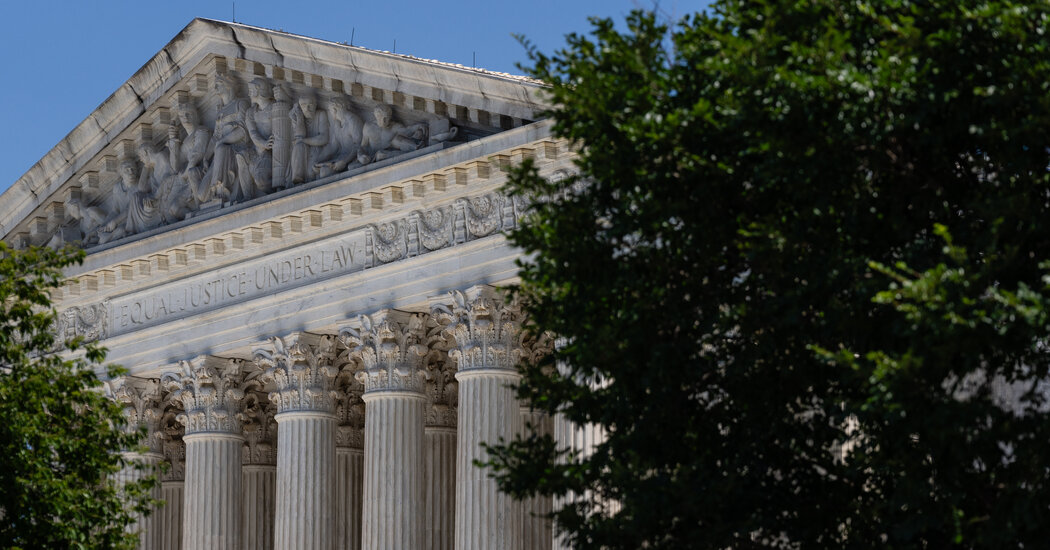The Supreme Court agreed on Monday to consider a Tennessee law that bans certain medical treatments for transgender minors, the first time the justices will decide the constitutionality of such statewide bans.
The move could have broad ramifications for the about 20 states that have enacted similar measures. It comes as a wave of Republican-led state legislatures have pushed to curtail transgender rights. Those efforts include legislation in recent years that targets gender-transition care and laws that regulate other parts of life, including which bathrooms students and others can use and which sports teams they can play on.
The justices will hear the case, United States v. Skrmetti, in its next term, which typically begins on the first Monday in October, though no date has been set yet for oral argument. The justices had considered whether to hear two challenges to transition care, including the Tennessee appeal and one centered on a Kentucky law, but had repeatedly postponed making a decision, suggesting there may have been debate over whether to do so.
The court’s decision to take up the case signals a willingness by at least some of the justices to delve into yet another polarizing social issue, even as they have yet to rule on some of the biggest cases for this term, involving emergency abortion care, disinformation on social media and the scope of presidential power.
The Biden administration had asked the justices to intervene after a federal appeals court upheld the ban. In Tennessee, the law prohibits three types of transgender medical care for minors — puberty blockers, cross-sex hormones and gender-transition surgeries.
The administration has argued that the law violates the equal protection clause of the 14th Amendment because it “frames that prohibition in explicitly sex-based terms.” Solicitor General Elizabeth B. Prelogar, in the government’s petition to the court, wrote that the law bans transgender medical care but that Tennessee “leaves the same treatments entirely unrestricted if they are prescribed for any other purpose.”
In his brief, the attorney general for Tennessee, Jonathan Skrmetti, claimed that the number of minors receiving medical treatment for gender dysphoria had risen sharply in recent years, prompting Tennessee and other states to respond “by enacting laws designed to ensure that potentially irreversible sex-transition interventions of uncertain benefit are not performed on minors who may not be able to fully grasp their lifelong consequences and risks.”
He added that such treatments “carry serious and potentially irreversible side effects, including infertility, diminished bone density, sexual dysfunction, cardiovascular disease, and cancer.”
The Biden administration pushed back strongly on this notion, pointing out that such treatment is rare and citing guidelines that medical interventions for transgender adolescents occur only in “appropriate cases, after the adolescent undergoes a comprehensive assessment to ensure that any intervention is medically necessary.”
The federal government’s brief argued that “overwhelming evidence” showed that “appropriate gender-affirming treatment with puberty blockers and hormones directly and substantially improves the physical and psychological well-being of transgender adolescents with gender dysphoria.”
This spring, the justices temporarily allowed Idaho to enforce a state ban that limited medical treatment for transgender youth. The law, passed by the state’s Republican-controlled Legislature, makes it a felony for doctors to provide transgender medical care for minors, including hormone treatment.
The decision in that case, which came to the justices as an emergency application, appeared to split largely along ideological lines, with the court’s liberals dissenting.
Federal courts have splintered over laws aimed at blocking transition care, allowing the measures in some states and banning them in others, intensifying pressure on the Supreme Court to intervene.
The Tennessee case traces back to November 2022, when a group of Tennessee legislators introduced a bill outlawing transgender care for minors.
After the law went into effect in July 2023, a group of legal advocacy organizations, including the American Civil Liberties Union, the A.C.L.U. of Tennessee and Lambda Legal, sued the state, seeking to block the law.
The groups brought the suit on behalf of Samantha and Brian Williams, a couple in Nashville, and their adolescent child, who is transgender, along with two other families and a doctor in Memphis, Susan Lacy.
The Kentucky law, known as S.B. 150, bans doctors from providing gender-transition surgery or administering puberty blockers or hormone therapy to people under 18.
In June 2023, federal judges in both states, in separate rulings, temporarily blocked the laws days before key parts of the laws were set to go into effect.
Shortly after, a divided panel on the U.S. Court of Appeals for the Sixth Circuit overturned the lower court decision, reinstating the bans. Plaintiffs in Kentucky and Tennessee appealed to the Supreme Court.
#Supreme #Court #Hear #Challenge #Tennessee #Law #Banning #Transition #Care #Minors,
#Supreme #Court #Hear #Challenge #Tennessee #Law #Banning #Transition #Care #Minors
